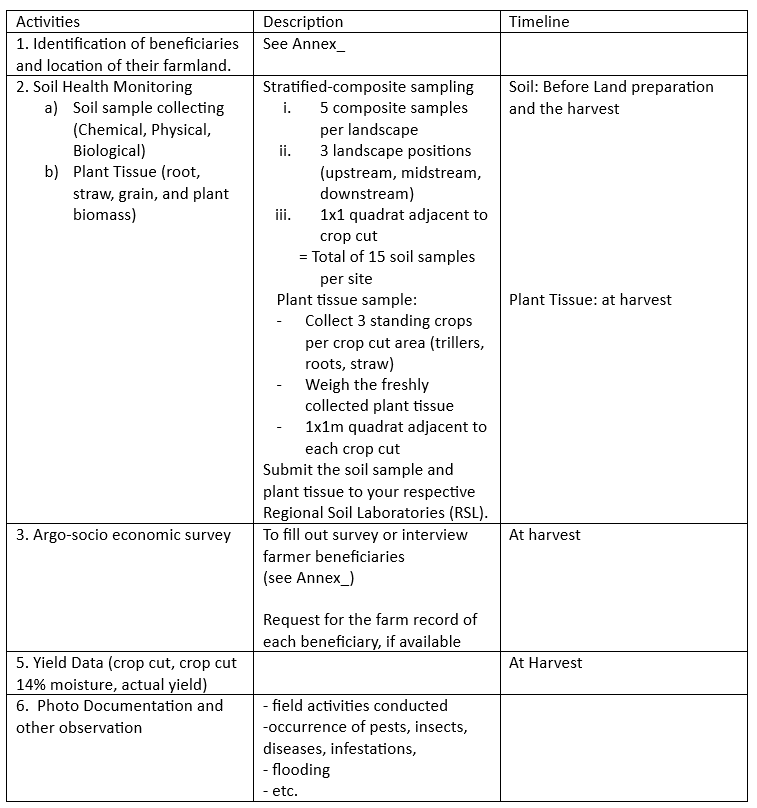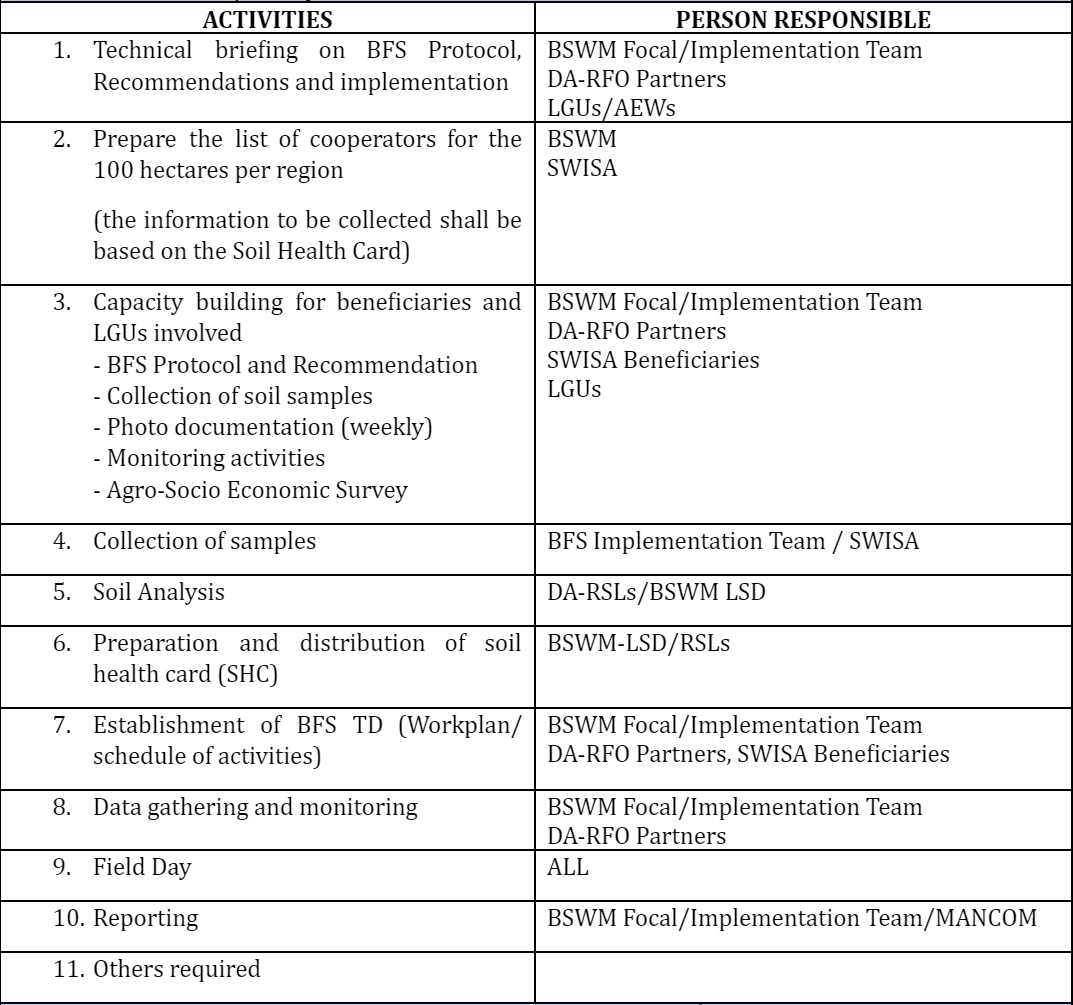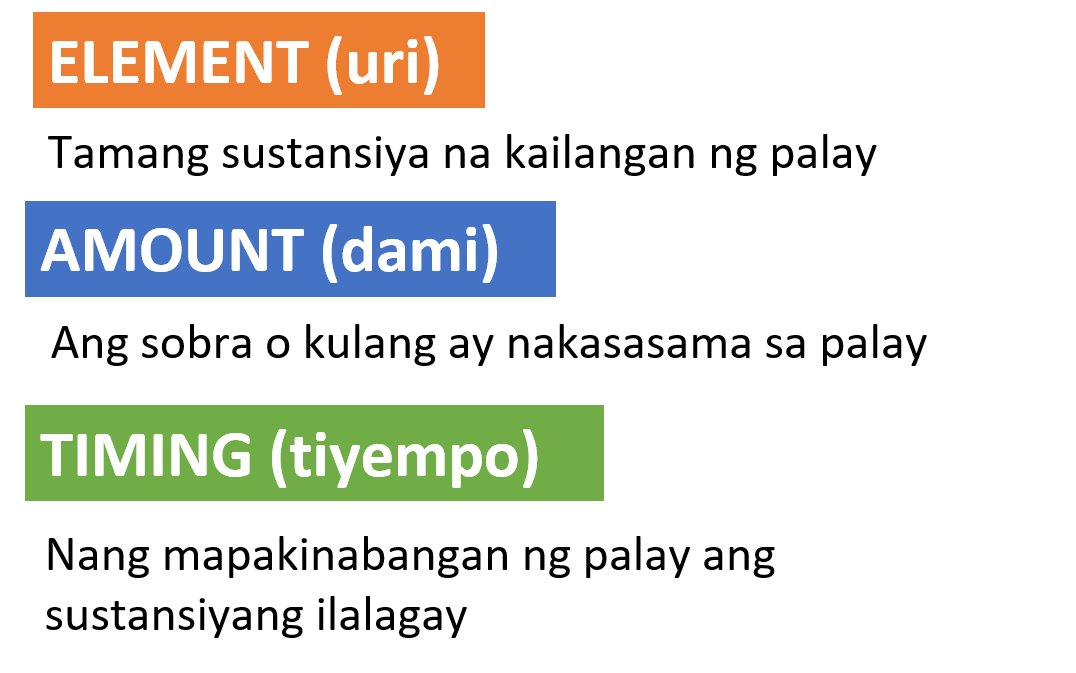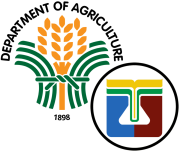BFS is a science-based farming method which focuses on the use of cost-efficient and proper combinations of organic and inorganic fertilizers to sustain increase in rice productivity.
BFS addresses concerns on soil fertility and plant nutrition to reduce production cost, increase yields and maintain healthy soils.
The proper application of the right element and right element amount of fertilizers and right timing can save on fertilizers costs and greatly improve nutrient use efficiency.
- Proclamation No. 1071 series of 1997 (Pres. Fidel Ramos) “Adoption of the Balanced Fertilization Strategy under the Gintong Ani Program of the Department of Agriculture.”
- DA Memorandum Circular No. 20 Series of 2020 “Adoption of Adaptive Balanced Fertilization Management to Enhance Crop Productivity and Increase Income of Rice Farmers.”
- DA Memorandum Order No. 74 Series of 2021 “Sustaining farm productivity, scaling balanced fertilization using fertilizer more effectively, applying cost-reducing practices and diversifying to increase income.”
- DA Memorandum dated March 14, 2022: Scaling-up of the Balanced Rice Fertilization to Mitigate the Impacts of Rising Fertilizer Cost through Information Campaigns and Technology Demonstration.
1. The combined application of organic and inorganic fertilizer can greatly reduce production cost through nutrient recycling and reducing application of inorganic fertilizer.
2. The use of organic fertilizer can improve the physical, chemical and biological properties of the soil while the inorganic fertilizer serves as the primary source of nutrients for plant growth.
3. The combined use of organic and inorganic fertilizer can restore soil health, increase agricultural productivity, cost-efficient while minimizing impact to the environment.
1. Serve as Chairperson of the Nutrient Management Campaign's Technical Working Committee (TWG);
2.Conduct needed analysis in collaboration with ATI, LGUs, and partners;
3. Plan, implement, and allocate funds for the conduct of technology demonstrations;
4. Organize, promote, and implement the project with partners;
5. Provide Subject Matter Specialists (SMS), when necessary;
6. Collate, process, and respond to feedback and queries from farmers;
7. Conduct and package the results of the impact evaluation research of the Nutrient Management Campaign in collaboration with DA-AFID and DA Regional Offices (RFOS):
8. Allocate funds for the production of campaign materials.
1. Allocate a hectare of rice area for the techno-demo for two seasons in area where there is no RCEF Palaysikatan/MOET site;
2. Allocate funds in the establishment of technology demonstration;
3. Allocate funds for the needed inputs and labor based on the detailed budget breakdown and keep all receipts corresponding to payments made related to techno-demo implementation;
4. Establish the techno-demo based on the approved protocol of BSWM, in coordination with the municipal, provincial/city LGUs;
5. Secure the techno-demo from intrusion, theft, damage, and pilferage;
6. Assist BSWM, PhilRice, ATI, and AFID in the gathering of data and other relevant information and in the monitoring/ implementation of the techno-demo:
7. Involve AFID units of the Regional Office in the planning and implementation of the campaign, including the localization of information material;
8. Submit Liquidation Report to the BSWM; and
9. Mobilize farmers to participate in the campaign.
a. Creates BFS Focal or teams for the Region and submit names to the BSWM for the creation of Special Order.
b. Provide a venue for one day technical briefing/orientation for DA Officials and LGUs.
c. Assists in the venue selection and negotiation to LGU for the capacity building of farmer beneficiaries (SWISA)-one day.
d. Assists in the procurement of catering services to be served during the Capacity Building and Field Day.
e. Assists in the delivery and inspection of all agricultural supplies.
f. Assists in the establishment, monitoring and data gathering of BFS TD.
g. In the absence of BSWM staff, conduct visits to the TD site and implement activities, if necessary.
h. Travel expenses of DA-RFO staff shall be charged against their agency fund.
Other BSWM/NSHP activities that need DA-RFO's support1. Regional Soil Laboratories (RSLs)
2. Establishment of National Soil Data Banking System (BSWM-DA-RSLs).
3. CFBW related activities.
It is also very important to check if the water supply can sustain the 67ha during the dry season and plan well the distribution in the area .
Those farmers who will not be able to join during the dry season can opt to plant another crop (crop diversification) to prevent the land from becoming idle.
In case of 2 failed biddings, the BSWM will shift to Small Value Procurement in the respective region.
Record any observation such as yellowing during monitoring. It will help us refine our protocol in the future. We should also check if the observed yellowing is due to nutrient deficiency or caused by pests. Through this BFS implementation, we can gather all data from all regions so that we can come up with more site-specific recommendations. eg. What BFS combo is more suitable in what areas; in what regions hybrid seeds are not applicable and/or in what type of soil, etc.
To prepare a tagalog powerpoint presentation for farmers which focuses on BFS Protocol and recommendations (Combo 2, 3, 4).
•List of Identified Beneficiaries
•Soil Health Card
•Agro-Socio Economic Survey
•Post-harvest Data Sheet (tiller count, biomass, crop cut yield, crop cut yield at 14% MC and actual yield)
•Protocol for all data to be gathered
•Protocol for soil sample collection ( stratified-composite soil sampling)
- Bureau of Soils and Water Management (BSWM)
- Philippine Rice Research Institute (PhilRice)
- Agricultural Training Institute (ATI)
- DA-Regional Field Offices (DA-RFOs)
- Regional Soil Laboratories (RSLs)
- DA-AFID
- SWISA
- Other Stakeholders (LGUs, NGOs, Farmers Association, Local Institutions among others).
The implementation team should encourage farmers to avail of crop insurance (eg. Phil Crop Insurance Corp.) to protect the beneficiaries from losses due to natural disasters, pests and diseases.







